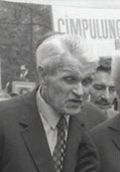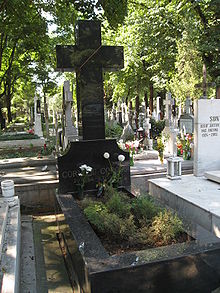- Corneliu Coposu
-
Corneliu Coposu 
Born May 20, 1914
Bobota, Sălaj CountyDied November 11, 1995 (aged 81)
BucharestReligion Greek-Catholic Corneliu Coposu (Romanian: [korˈnelju koˈposu]; 1914–1995) was a conservative Romanian politician.
Contents
Biography
Early life
Coposu was born in Bobota, Sălaj County (in Transylvania, part of Austria-Hungary at the time) to the Romanian Greek-Catholic archpriest Valentin Coposu (17 November 1886 - 28 July 1941) and his wife Aurelia Coposu (née Anceanu, herself the daughter of Romanian Greek-Catholic archpriest Iuliu Anceanu). Corneliu had four siblings: Cornelia (1911–1988), Doina (1922–1990), Flavia Bălescu (b. 1924), and Rodica (b. 1933).
He too was a devout member of the church and joined the Romanian National Party (PNR), a group dominated by Greek-Catholic politicians - Gheorghe Pop de Băseşti was an acquaintance of the Coposu family, and Alexandru Vaida-Voevod was a relative on Corneliu Coposu's mother's side.
After studying Law and Economy at the University of Cluj (1930–1934), he engaged in local politics with the PNR's direct successor, the National Peasants' Party (PNŢ), and worked as a lawyer.[1] He became private secretary of Iuliu Maniu, the leader of the PNR and PNŢ, who had been a decisive factor in Transylvania's union with Romania (1918).[2]
World War II
Coposu moved to Bucharest in 1940, when Northern Transylvania was ceded to Hungary, and, during World War II, he was an important member of the PNŢ delegation in the clandestine opposition to Ion Antonescu's regime.[3] He established links between the movement and the United Kingdom, and was one of the politicians charged with maintaining contacts between Romanian politicians who were negotiating the country's exit from the Axis Powers and the Western Allies (an alternative kept by the Antonescu government).
In 1945, after the royal coup against the Antonescu regime, Coposu became deputy secretary of the PNŢ and, after the reunion of Northern Transylvania, the party's delegate to the leadership of provisional administrative bodies. He was also active in organizing the party as the main opposition to the Communist Party and the Petru Groza cabinet before the 1946 general election.[4]
Communist persecution
The communist regime established with Soviet assistance, arrested him on July 14, 1947, together with all the leadership of the National Peasants' Party, after some of the party leadership had allegedly tried to flee the country in a plane landed at Tămădău (see Tămădău Affair). He was imprisoned without trial for nine years, as all charges brought against him were dismissed due to lack of evidence. Coposu later attested that his imprisonment, imposed by Soviet officials overseeing the Securitate, was among those causing a stir in the higher echelons of the Communist Party — Belu Zilber, a Communist who was purged together with Lucreţiu Pătrăşcanu, later told him that prominent party politician Ana Pauker had unsuccessfully opposed the move in front of Gheorghe Gheorghiu-Dej.[5]
In 1956, Coposu was sentenced to life imprisonment for "betrayal of the working class" and "crime against social reforms". In April 1964, he was freed after 15 years of detention and 2 years of forced residence in Rubla (Brăila County), having spent, in all, 17 years of incarceration in 17 notorious detention and hard labor facilities associated with the communist regime,[6] including Sighet prison, Gherla, Jilava, Râmnicu Sărat, Piteşti prison, and the Danube-Black Sea Canal (where he was imprisoned with his friend and collaborator Şerban Ghica).[7]
Coposu later testified having been impressed by the deep scars collectivization had left in the country,[8] as well as by the resilience of the Rubla deportees (see Bărăgan deportations) — "They traded in vegetables they had grown themselves while locals could not be convinced that these could actually grow on the Bărăgan".[9] In the 1990s, during debates over the overall number of victims of the Communist regime between 1947 and 1964, Coposu spoke of 282,000 arrests and 190,000 deaths in custody.[10]
After his release, Coposu started work as an unskilled worker on various construction sites (given his status as a former prisoner, he was denied employment in any other field), and was subject to Securitate surveillance and regular interrogation.[11]
His wife Arlette was also prosecuted in 1950 during a rigged espionage trial, and died in 1965, soon after her release, from an illness contracted in prison.
Coposu managed to keep contact with PNŢ sympathisers, and re-established the party as a clandestine group during the 1980s, while imposing its affiliation to Christian Democracy and the Christian Democrat International.[12]
Post-communism
On December 22, 1989 (during the Romanian Revolution), he and Ion Raţiu issued a manifesto that confirmed the PNŢ's entry into legality, under the name Christian-Democratic National Peasants' Party.
For the rest of his life, Coposu was the main voice of the opposition to the National Salvation Front (from 1992, the Democratic National Salvation Front).[13] Present at his party's headquarters, he was targeted by the first Mineriad on January 28, 1990, but was protected by Prime Minister Petre Roman, who protected him from violence by commissioning an armored vehicle to drive him away.[14]
He successfully grouped various organizations into the Romanian Democratic Convention (CDR), of which he was the leader between 1991 and 1993.[15] He was elected to the Senate of Romania in the 1992 general election. In 1995, the government of France granted him the Grand Officier de la Légion d'Honneur during a ceremony in Bucharest. A staunch monarchist who supported reinstating Mihai I as King of Romania,[16] Coposu nevertheless personally promoted Emil Constantinescu as the CDR's candidate for the presidential office.[17]
The death
 His grave at Bellu Catholic Cemetery
His grave at Bellu Catholic Cemetery
He died in Bucharest while undergoing treatment for lung cancer. Some 100,000 people attended his funeral three days later.[18] He was buried in the Catholic section of Bellu cemetery.
One of the main thoroughfares in the capital now bears his name. A bust of Coposu now stands next to Kretzulescu Church, in Revolution Square.
In a 2006 poll conducted by Romanian Television to identify the "greatest Romanians of all time", Coposu came in 39th.
Notes
- ^ Tismăneanu, p.270
- ^ Tismăneanu, p.279
- ^ Roman jr.
- ^ Roman jr.
- ^ Levy, p.284
- ^ "Distrugerea ţărănimii"
- ^ "Distrugerea ţărănimii"; Roman jr.
- ^ "Distrugerea ţărănimii"
- ^ Coposu, in "Distrugerea ţărănimii"
- ^ Cioroianu, p.313
- ^ Deletant, Preface, p.xxvii-xxix
- ^ Prelipceanu, p.31-32
- ^ Tismăneanu, p.270, 279, 281
- ^ Gheorghe & Huminic
- ^ Tismăneanu, p.270
- ^ Tismăneanu, p.281, 360
- ^ Tismăneanu, p.270
- ^ OMRI Daily Digest, No. 223, November 15, 1995
References
- (Romanian) "Distrugerea ţărănimii" ("The Destruction of the Peasant Class"), in Jurnalul Naţional
- Adrian Cioroianu, Pe umerii lui Marx. O introducere în istoria comunismului românesc ("On the Shoulders of Marx. An Incursion into the History of Romanian Communism"), Editura Curtea Veche, Bucharest, 2005
- Dennis Deletant, Ceausescu and the Securitate: Coercion and Dissent in Romania, 1965-1989, M.E. Sharpe, Armonk, New York, 1995
- (Romanian) Gabriela Gheorghe, Adelina Huminic, "Istoria mineriadelor din anii 1990-1991" ("The History of the 1990-1991 Mineriads"), in Sfera Politicii
- Robert Levy, Ana Pauker: The Rise and Fall of a Jewish Communist, University of California Press, Berkeley, 2001
- Nicolae Prelipceanu's interview with Corneliu Coposu, in Agora, IV/4, October–December 1991, pp. 29–40
- (Romanian) Toma Roman jr., "Nobleţe - Modestie princiară" ("Noblesse - Princely Modesty"), in Jurnalul Naţional, August 25, 2005
- Vladimir Tismăneanu, Stalinism pentru eternitate, Polirom, Iaşi, 2005 ISBN 973-681-899-3 (translation of Stalinism for All Seasons: A Political History of Romanian Communism, University of California Press, Berkeley, 2003, ISBN 0-52-023747-1)
External links
- (Romanian) Corneliu Coposu foundation
- (Romanian) Short bio on the Romanian Chamber of Deputies site
- (Romanian) Short bio on the Sighet Memorial site
- (Romanian) Corneliu Coposu on the condition of the intellectual, Radio Free Europe interview, February 1993
- (Romanian) "Corneliu Coposu" at the Mari Români site
- (Romanian) More about Corneliu Coposu
Categories:- 1914 births
- 1995 deaths
- People from Sălaj County
- Babeş-Bolyai University alumni
- Inmates of Sighet prison
- Deaths from lung cancer
- National Peasants' Party politicians
- People of the Romanian Revolution of 1989
- Romanian Austro-Hungarians
- Romanian anti-communists
- Romanian Greek-Catholics
- Romanian lawyers
- Members of the Senate of Romania
- Burials at Bellu
- Cancer deaths in Romania
- Grand Officiers of the Légion d'honneur
Wikimedia Foundation. 2010.
